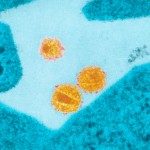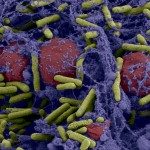Link to Pubmed [PMID] – 16501104
J. Virol. 2006 Mar;80(6):2949-57
The C-type lectin DC-SIGN expressed on immature dendritic cells (DCs) captures human immunodeficiency virus (HIV) particles and enhances the infection of CD4+ T cells. This process, known as trans-enhancement of T-cell infection, has been related to HIV endocytosis. It has been proposed that DC-SIGN targets HIV to a nondegradative compartment within DCs and DC-SIGN-expressing cells, allowing incoming virus to persist for several days before infecting target cells. In this study, we provide several lines of evidence suggesting that intracellular storage of intact virions does not contribute to HIV transmission. We show that endocytosis-defective DC-SIGN molecules enhance T-cell infection as efficiently as their wild-type counterparts, indicating that DC-SIGN-mediated HIV internalization is dispensable for trans-enhancement. Furthermore, using immature DCs that are genetically resistant to infection, we demonstrate that several days after viral uptake, HIV transfer from DCs to T cells requires viral fusion and occurs exclusively through DC infection and transmission of newly synthesized viral particles. Importantly, our results suggest that DC-SIGN participates in this process by cooperating with the HIV entry receptors to facilitate cis-infection of immature DCs and subsequent viral transfer to T cells. We suggest that such a mechanism, rather than intracellular storage of incoming virus, accounts for the long-term transfer of HIV to CD4+ T cells and may contribute to the spread of infection by DCs.



